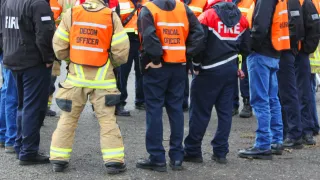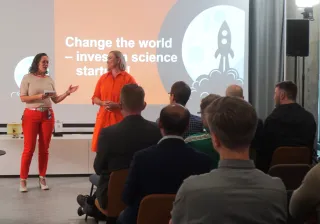Crises and serious disruptions, such as pandemics or sudden changes in the global political environment, can undermine people’s sense of security. If society is not well prepared, the social impact of such crises can increase manyfold. A research project coordinated by VTT Technical Research Centre of Finland has developed methods for boosting European crisis resilience. The outcome was a practical toolkit aimed at those responsible for crisis management, communications and emergency planning.
Societal crises are particular threatening for vulnerable people. Factors such as deprivation, homelessness, health challenges and substance use put people at greater risk both during and after times of crisis. It is regrettably common, however, for such groups to be given little attention in crisis preparation work.
VTT Technical Research Centre of Finland has been coordinating a three-year EU project which has been examining crisis management from the perspective of vulnerable people. By recognising vulnerable people, improving their access to information, and developing the work of official bodies, we can support the capacity of these groups to function well during crisis situations. This strengthens the crisis resilience of society as a whole.
Technological solutions can help to identify and reach the right people
The research project explored technological solutions for identifying and locating vulnerable people. The solutions are based on data collected from smartphones and drones as well as crowdsourcing within social media. Good situational awareness requires a versatile approach – the best information is obtained by combining multiple data collection methods and analysing the data with artificial intelligence.
Vulnerable people can also be supported by improving their access to information. These groups are not always reached by traditional media, common online services, or information shared in social media. In addition, they may be more vulnerable to the deliberate dissemination of false and harmful information. It is therefore important to share information with people in vulnerable situations via accessible and trusted channels, such as NGOs that provide support to these groups. To support official bodies in reaching these special groups, the project developed a simulation exercise platform and trailed it out with the police and rescue authorities.
“We are very pleased to have increased public authorities’ awareness of the specific needs of vulnerable people both during and after crisis situations. At the same time, we have strengthened the authorities’ connections with bodies that represent vulnerable people – and particularly with NGOs,” says VTT’s Research Scientist Jaana Keränen.
Another important output of the project was an online training package, designed for the European Union Agency for Law Enforcement Training (CEPOL) and Finland’s Police University College.
“Study material in this domain is an important enrichment to the training portfolio that CEPOL offers. It allows us to prepare law enforcement officers to engage with audiences who have cognitive or mental health challenges”, says Julian ter Huurne, eLearning Officer at CEPOL.
“We have received excellent feedback from European law enforcement agencies on the training for communication and interaction skills. Our own students who participated in the pilot also liked the course and found it useful for themselves,” reports Researcher Pirjo Jukarainen from the Police University College.
Widely applicable results
The research results were used to shape recommendations for improving crisis resilience at the local, national and European level. These approaches can be utilised during both natural disasters and human-caused disruptions such as cyber attacks on critical infrastructure.
For more information about the tools developed in the project, visit https://buildersproject.eu/
The BuildERS project ran from 2019 to 2022. It was funded by the EU’s Horizon 2020 programme and had a total budget of €4.9 million. The consortium was composed of 17 partners from ten different countries. It included universities, research institutes, public authorities, companies and voluntary organisations. VTT coordinated the project, and the Police University College of Finland was responsible for the validation of research results and joint development of innovations. The project featured a total of 25 events which drew in nearly 500 experts from 22 different countries.





